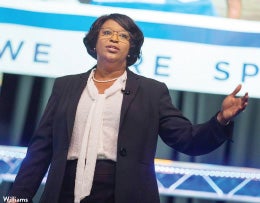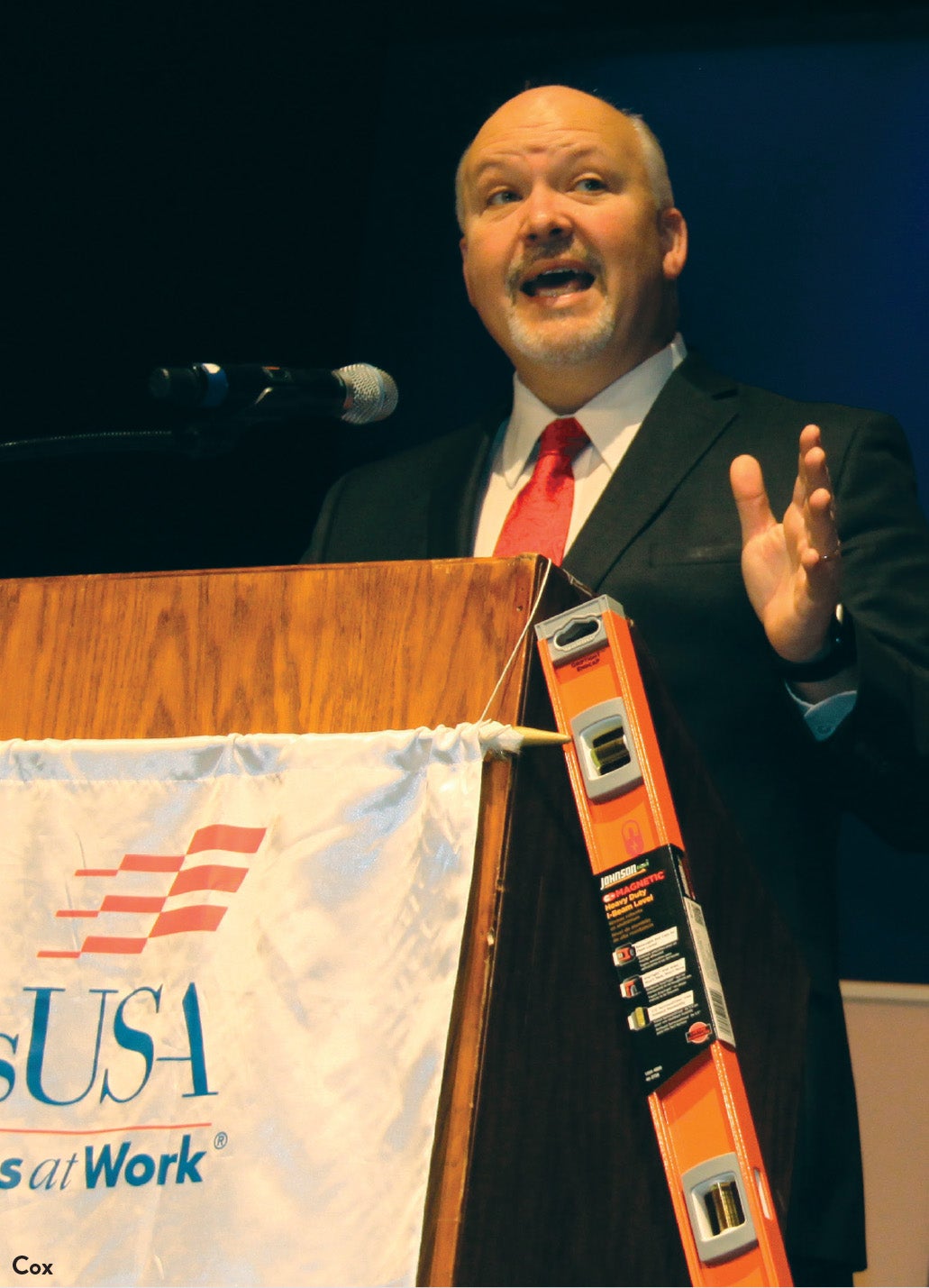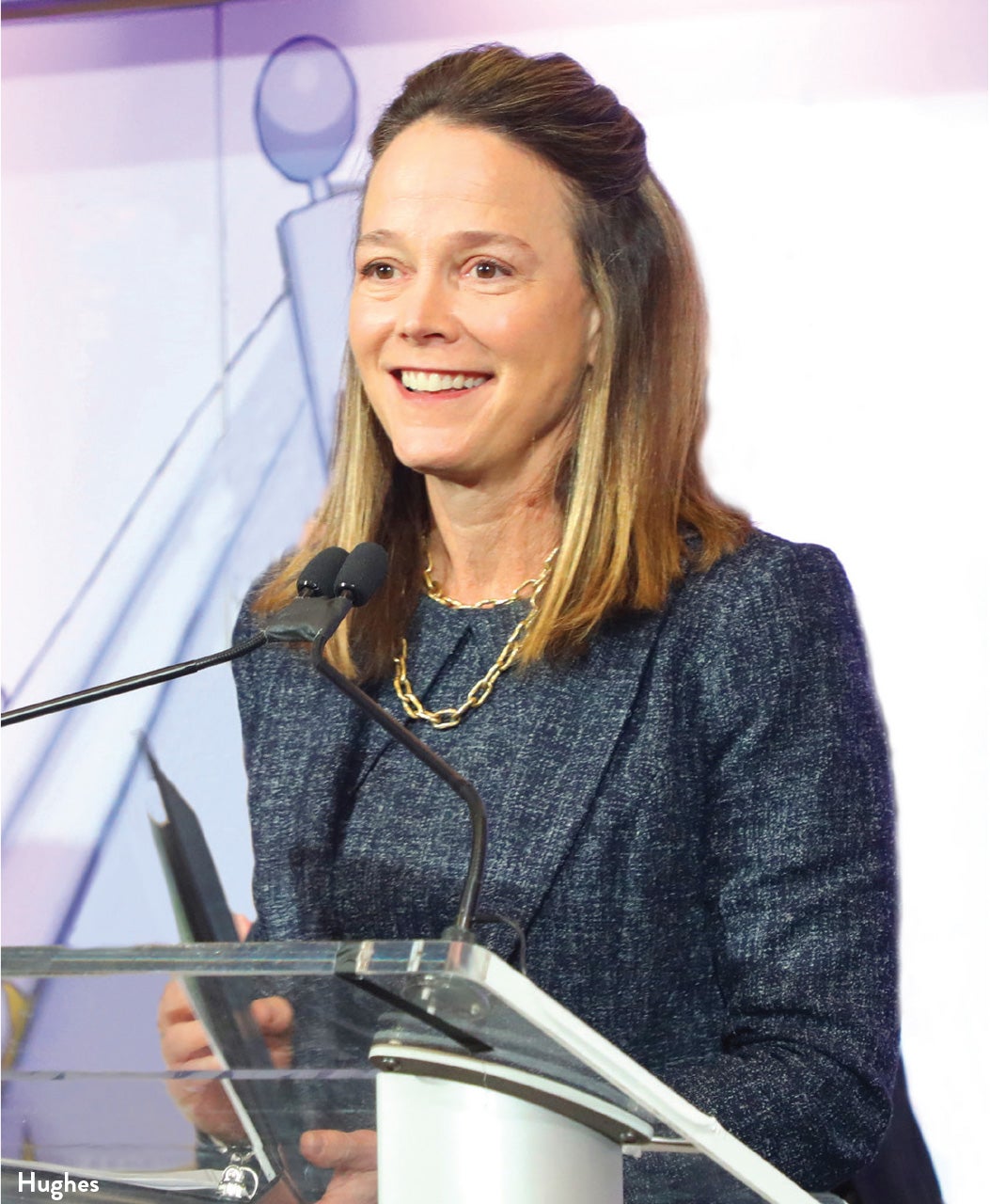It’s time to start thinking about the next generation of community college presidents. The American Association of Community Colleges predicts that more than 80 percent of them are going to retire over the coming decade. To fill the void, in 2016 the Institute’s College Excellence Program created the Aspen Presidential Fellowship for Community College Excellence. Each year, the Institute selects 40 aspiring community college presidents for the fellowship, which nurtures enthusiastic and capable leaders who will create transformational change on behalf of their students.
In 2018, the program welcomed its third cohort of fellows, a diverse group by design. While only one-third of sitting community college presidents are female, twothirds of the members of the 2018–2019 class of Aspen Presidential fellows are. What’s more, 43 percent of fellows are people of color, compared with just 29 percent of sitting presidents.
The yearlong fellowship, a collaboration with the Stanford Educational Leadership Initiative, includes one-onone mentoring, three residential seminars, and a capstone project. Unlike other training programs for college leaders, this one focuses solely on student success, which the program defines as student learning, degree or credential completion, success after transfer to a four-year school or in the workforce, and equitable outcomes for students of all backgrounds.
The fellowship chooses candidates who are already excellent leaders—like the three alumni featured here, now all college presidents—and provides them with the tools to build solutions, spur urgency, and establish the partnerships necessary to get the work done.
“I Am Forever Connected to a Great Group of Leaders”
By Tonjua Williams
 The Aspen Presidential Fellowship experience gave me a better understanding of the definition of “student success” and the strategies necessary to lead my team to accomplish it. I intensified my focus on the labor market as well as access and success for underrepresented and underprepared students. For my capstone project, I created an educational ecosystem to solve problems in collaboration with area employers, faith-based organizations, community partners, and other educational institutions.
The Aspen Presidential Fellowship experience gave me a better understanding of the definition of “student success” and the strategies necessary to lead my team to accomplish it. I intensified my focus on the labor market as well as access and success for underrepresented and underprepared students. For my capstone project, I created an educational ecosystem to solve problems in collaboration with area employers, faith-based organizations, community partners, and other educational institutions.
I now meet with local communities one at a time and ask: “What jobs are out there? What kind of employees are you producing? What’s missing from what we are teaching?” I no longer offer programs with no future just because we can get students into seats. If a child-care certificate only leads students to a $10-an-hour job, it’s not enough. I refuse to have a St. Petersburg College degree on the wall of someone living in poverty.
Faculty are key to achieving our goals. Building relationships with faculty and understanding their need to be engaged, empowered, and included is vital to institutional health. But including faculty in decision-making is not enough; we must also call on them to ensure that students get an education and finish what they start.
Finally, I’ve learned to ask for help. While confidence is important for a leader, it is also good to know you can call on others to assist you. Two years later, the 39 fellows in my class communicate practically every day: What skill set would you look for when hiring a vice president of advancement? What strategies do you use to engage faculty? I am forever connected to a great group of leaders who are determined to change the world.
Tonjua Williams is the president of St. Petersburg College in St. Petersburg, Florida, and a 2016–2017 member of the Aspen Presidential Fellowship.
“A Laser-Sharp Focus on Student Success”
By Jeff Cox
 At convocation this year, I had all of our 300 faculty and staff members stand up. I told them they represented our student body at Wilkes Community College. Then I had a quarter of them sit down; they represented the students who don’t return after their first semester. Then I had another quarter sit down; they were the students who don’t complete their first year. Then I asked another quarter to sit; they represented the students who last a year or two but never graduate. I asked, “Is anybody here satisfied?” No one was. By the time we completed the exercise, only a few faculty remained standing. They represented the 4 percent of graduates who make at least $20 an hour within one year of graduation. You could have heard a pin drop.
At convocation this year, I had all of our 300 faculty and staff members stand up. I told them they represented our student body at Wilkes Community College. Then I had a quarter of them sit down; they represented the students who don’t return after their first semester. Then I had another quarter sit down; they were the students who don’t complete their first year. Then I asked another quarter to sit; they represented the students who last a year or two but never graduate. I asked, “Is anybody here satisfied?” No one was. By the time we completed the exercise, only a few faculty remained standing. They represented the 4 percent of graduates who make at least $20 an hour within one year of graduation. You could have heard a pin drop.
From that moment, we all understood the urgency of what we needed to do. I issued a bold challenge that day: let’s move our three-year graduation rate from 25 percent to 50 percent in the next five years.
I’d been president for three years before the Aspen Presidential Fellowship, which is where I’d learned that convocation exercise. I had a vision for this work, or at least the start of one. But I really didn’t know as much as I needed to about actual outcomes. At college, we’d talk anecdotally about the graduates we knew who were making good money as a nurse or a diesel mechanic. But once we looked at the data in the ways I’d learned to in the fellowship, we realized that those success stories aren’t as common as we would like.
We identified the careers in our area that pay students a living wage. Then we asked, “What’s the educational pathway to get there?” We placed a career coach in each of the high schools in our area. We are building apprenticeship programs and infusing our curriculum with work-based learning and the soft skills that employers told us new hires were lacking. We are revamping our business and industry advisory committees to ensure we have the right people at the table to help shape the curriculum.
This all stemmed from strategic planning, the framing for which came from my capstone project. Our college had sort of accepted its 25 percent graduation rate, which was above the national average. But the fellowship gave me the tools I needed to put a laser-sharp focus on student success. My mentor was Bob Templin, a senior fellow at the Institute and one of the most prominent community college leaders in the country. Having him and the Institute’s research behind us made all the difference in mobilizing the college community around our bold plans.
Jeff Cox is president of Wilkes Community College in Wilkesboro, North Carolina, and a 2017–2018 member of the Aspen Presidential Fellowship.
“We Do This Because It’s the Right Thing to Do”
By Meghan Hughes
 I didn’t need the Aspen Presidential Fellowship to give me a new set of values or leadership approaches. I did need worldclass teachers who would share the hard lessons others had learned that I could avoid. And I needed hands-on tools to help me convert my priorities into action.
I didn’t need the Aspen Presidential Fellowship to give me a new set of values or leadership approaches. I did need worldclass teachers who would share the hard lessons others had learned that I could avoid. And I needed hands-on tools to help me convert my priorities into action.
I’ve been president for almost three years, and we’ve already made real progress—and much of the design behind the progress came from what I learned through the fellowship. We launched a “guided pathways” program, an essential building block that, along with “intrusive advising,” keeps our students on the right path. We created a master schedule so our 20,000 students could have predictable class plans. We completely redesigned our workforce division, hired a prominent leader to run it, and built partnerships with employers in high-wage sectors. We refocused our advancement team around the student-success mission and, in the process, secured the two largest private gifts in the college’s history.
We had professors redesign the way we teach developmental math, so that students can work at their own pace with close coaching from their teachers. We also introduced multiple math pathways, because future engineers and future English teachers need different math classes. Passing rates in our gateway English courses have improved by nearly 50 percent, and math pass rates have improved nearly 40 percent. Our graduation rate has increased 27 percent. We still have a meaningful distance to go, but we are on our way.
I genuinely learned something from every single person in the fellowship. The teachers at the front of the room were exceptional. But the best teachers, day in and day out, have been my peers. The intensity of their belief—people who have given their careers to the public good—I carry that with me. If you just keep at it, it’s going to work.
Meghan Hughes is the president of the Community College of Rhode Island and a 2016–2017 member of the Aspen Presidential Fellowship.